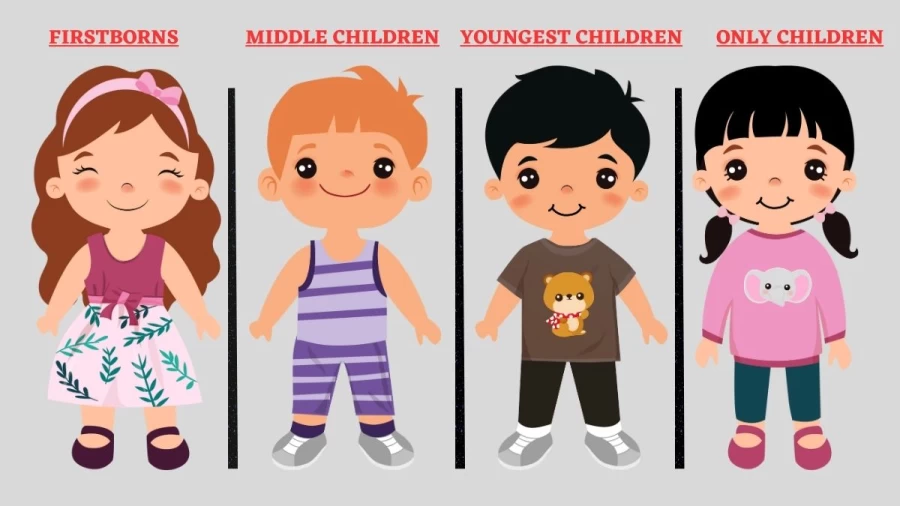How Birth Order Affects Your Love Life | Birth Order Personality Test
by J Nandhini
Updated May 25, 2023

Firstborns in Love
Firstborns, as the eldest in the family, often exhibit traits of responsibility, leadership, and authority. These qualities can greatly influence their approach to relationships. Firstborns are known to have high expectations for themselves and their partners, seeking perfection in their love lives. Their natural inclination towards leadership can sometimes manifest as a strong desire to be in control within relationships. However, their sense of responsibility and reliability can also make them dependable partners. Firstborns tend to be compatible with different birth orders, finding balance with middle children and offering guidance to younger partners.
Middle Children in Love
Middle children, sandwiched between the older and younger siblings, often develop traits such as flexibility, diplomacy, and the ability to navigate different perspectives. In relationships, middle children tend to be peacemakers, striving for harmony and avoiding conflicts. Their negotiation skills come into play when resolving issues between partners. Middle children seek balance in their love lives, valuing fairness and compromise. Their adaptable nature allows them to form connections with various birth orders, creating a harmonious blend of personalities in relationships.
Youngest Children in Love
Youngest children are often characterized as charming, outgoing, and attention-seeking. Growing up in a family where they are the "baby," they may exhibit a more carefree and playful attitude. In love, youngest children bring a sense of spontaneity and fun to relationships. They enjoy being the center of attention and often thrive in social settings. Youngest children tend to have compatible dynamics with older partners who can provide guidance and stability. However, they may sometimes struggle with assuming responsibilities in relationships, preferring a more carefree approach.
Only Children in Love
Only children grow up without siblings and often develop traits of independence, self-sufficiency, and a strong sense of identity. In relationships, they value their personal space and autonomy. Only children are comfortable with solitude and often require alone time to recharge. Their self-sufficiency can make them less dependent on their partners, which can be both a strength and a challenge. Only children may struggle with compromising and sharing their lives, but they also bring a unique level of independence to their relationships. Compatibility with other birth orders depends on individual differences and the willingness to adapt and compromise.
Blended Families and Love
Blended families, where individuals from different birth orders come together, present unique relationship dynamics. Integrating birth orders and personalities within these families can be complex. It requires open communication, empathy, and understanding. Blended families often involve step-siblings with different birth orders, and navigating these relationships requires patience and respect for each person's unique traits. By recognizing and appreciating the strengths of each birth order, blended families can create harmonious and fulfilling love lives.
Love and Birth Order: Myths and Realities
There are several common misconceptions about the influence of birth order on love life. While birth order can provide insights into personality tendencies, it is important to recognize that individual differences play a significant role as well. Each person is unique and may deviate from the typical traits associated with their birth order. Factors such as upbringing, life experiences, and personal choices also shape an individual's approach to relationships. Therefore, while birth order can offer valuable insights, it is essential to consider the complete context when analyzing love life dynamics.
Birth order undeniably affects various aspects of our lives, including our love lives. Firstborns often exhibit leadership qualities and high expectations, while middle children bring a sense of balance and diplomacy. Youngest children infuse relationships with charm and playfulness, while only children value independence and self-sufficiency. Blended families require understanding and empathy to integrate different birth orders successfully. However, it is crucial to remember that individual differences and personal choices also significantly impact relationships. By appreciating the unique traits and dynamics associated with different birth orders, individuals can navigate their love lives with greater insight and understanding.
How Birth Order Affects Your Love Life | Birth Order Personality Test - FAQs
Birth order provides insights into compatibility, but it is not the sole determinant. Individual differences, values, and communication styles also influence relationship compatibility.
While birth order can influence relationship dynamics, success in a long-term relationship depends on various factors, including mutual respect, communication, and shared values.
Yes, there can be exceptions. Birth order provides general tendencies, but individual differences and personal experiences also shape an individual's personality and behavior.
Blended families can navigate challenges by fostering open communication, empathy, and understanding. Recognizing and appreciating the strengths of each birth order can help create a harmonious family dynamic.
Yes, birth order can influence relationships in non-traditional families as well. The impact may vary depending on the family structure and the roles individuals assume within the family.







